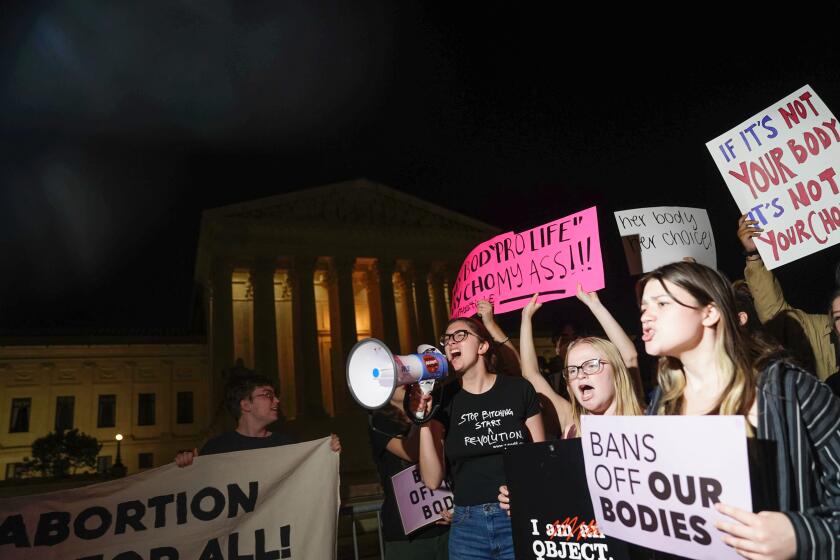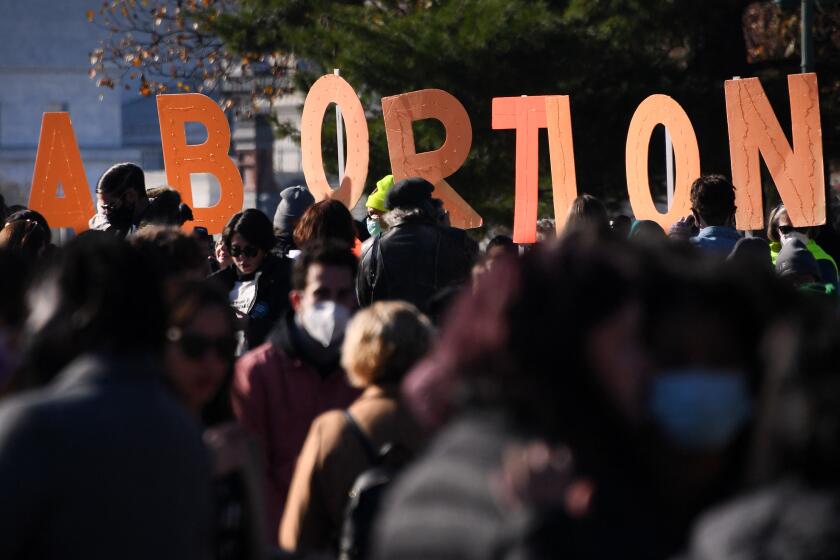California constitutional amendment securing abortion, contraceptive rights goes to voters

- Share via
SACRAMENTO — California voters will decide in November whether the state Constitution should explicitly protect a person’s right to an abortion, and Gov. Gavin Newsom announced new efforts to solidify “California’s status as a reproductive safe haven for women.”
On Monday, the Democratic-controlled Legislature gave final approval to the abortion measure, which puts the issue before the state’s voters in the latest countermeasure aimed at the U.S. Supreme Court’s decision to overturn Roe vs. Wade.
Just hours later, Newsom issued an executive order that said California will not share medical records with antiabortion states or extradite doctors who provide care to patients seeking the procedure here.
“California will not back down from the fight to protect abortion rights as more than half the states in this country, enabled by the Supreme Court, ban or severely restrict access,” Newsom said Monday. “We are ensuring Californians will have the opportunity this November to enshrine the right to choose in our state Constitution.”
Senate Constitutional Amendment 10 by Senate President Pro Tem Toni Atkins (D-San Diego) would, if approved by voters, further codify the state’s already progressive reproductive rights, which grant anyone of reproductive age “the fundamental right to choose to bear a child or to choose and to obtain an abortion.” Currently, those rights in California are held up by case law and statutory laws, but Atkins said hostile attacks on abortion access convinced her those aren’t enough.
“We know from history that abortion bans don’t end abortion,” said Assembly Speaker Anthony Rendon (D-Lakewood), a co-author of SCA 10. “They only outlaw safe abortions. We must preserve the fundamental reproductive rights of women here in California, because they are under attack elsewhere.”
California’s governor clearly embraces his rise as a dominant, resonating voice for Democratic states nationwide
With the measure now headed to the November ballot, the debate over abortion rights could boost voter turnout and force candidates in contested statewide and legislative races to reckon with an issue that has deeply divided the country.
Among likely voters in the state, 76% said they did not want Roe vs. Wade overturned, according to a poll earlier this year by the nonpartisan Public Policy Institute of California.
Democratic lawmakers introduced more than a dozen bills in California in anticipation of the landmark case being upended, including two already signed into law by Gov. Gavin Newsom this year. The governor signed a bill Friday that immediately protects abortion providers in California from civil liability judgments based on claims made in antiabortion states. Health insurers licensed by the state will be required to cover the full cost of an abortion, without a copay, deductible or other cost-sharing, under a bill Newsom signed in March.
Newsom and legislative leaders reached a budget agreement Sunday with $200 million in additional funding for reproductive care, including abortion services for the uninsured, workforce programs to increase the number of providers and financial assistance to patients traveling from other states.
Newsom’s executive order on Monday prevents patient data and medical records from being shared by state agencies in response to an out-of-state investigation into abortion care provided in California.
California officials have been preparing for an influx of patients from areas of the country where bans will be resurrected for the first time since federal abortion rights were established in 1973.
In the wake of Roe vs. Wade being struck down, Gov. Gavin Newsom has signed a bill aimed at further solidifying California’s status as an abortion sanctuary.
A study by UCLA’s Center on Reproductive Health, Law, and Policy estimates that 8,000 to 16,000 more people will travel to California each year for abortion care now that the high court’s conservative majority ruled that states may again outlaw the procedure.
“We have to do everything in this state to say to the rest of the world that here in California, we are truly a reproductive freedom state for all,” said Assemblymember Buffy Wicks (D-Oakland), who added that her own abortion when she was 25 years old allowed her to build a career and have a family when she was ready.
“That decision was critical for me and it was mine,” Wicks said.
California law allows a woman to have an abortion until the point that a physician determines “there is a reasonable likelihood of the fetus’ sustained survival outside the uterus without the application of extraordinary medical measures” or if the procedure is necessary in order to “protect the life or health of the woman.” Those rights are afforded to anyone who becomes pregnant, regardless of age. That includes minors, who under state law can consent to an abortion without a parent’s knowledge.
State law does not stipulate the exact point in a pregnancy when viability occurs, instead allowing a physician to make that determination based on “good faith medical judgment.” In most cases, doctors have considered a fetus viable at 24 weeks.
Under the constitutional amendment approved Monday, voters would decide whether to add additional protections directly in the state Constitution. SCA 10 prohibits “the state from denying or interfering with an individual’s reproductive freedom in their most intimate decisions, which includes their fundamental right to choose to have an abortion and their fundamental right to choose or refuse contraceptives.”
In the upcoming session, California legislators hope to push forward Senate Bill 245, which would put an end to out-of-pocket costs paid by those seeking abortions.
Erwin Chemerinsky, dean of UC Berkeley Law, said California already has strong abortion protections, making SCA 10 “more symbolic than anything else.”
During a lengthy partisan debate on SCA 10, Republicans raised concerns that the measure does not set restrictions to when abortions can be performed.
“If you believe in souls and that we’re God’s creatures, when does the baby get the soul?” said Randy Voepel (R-Santee). “... You might want to think about that.”
Republican Assembly Leader James Gallagher (R-Yuba City) said SCA 10 lacked clarity on whether it would change the state’s current law on when abortions are permitted after viability.
“It says nothing about late term,” Gallagher said. “It puts no restrictions on it. And so babies like my twins at 30 weeks, their lives could be taken.”
Atkins said that’s not true and that SCA 10 does not change current California law regarding viability.
“The false narrative about ‘abortions up until birth’ are unscientific and created to politicize the conversation about abortion, which is an essential and safe medical procedure,” Atkins said in a statement.
SCA 10 had to pass the state Senate and Assembly with two-thirds approval in each house before a Thursday deadline in order to be placed on the November statewide ballot. While Democrats hold enough seats in both houses to pass the constitutional amendment without Republican support, it earned a lone GOP vote in the Assembly on Monday.
“While I am personally pro-life with exceptions, I believe that voters should have a voice in deciding this issue in November,” said Assemblymember Suzette Martinez Valladares (R-Newhall) in a statement.
More to Read
Sign up for Essential California
The most important California stories and recommendations in your inbox every morning.
You may occasionally receive promotional content from the Los Angeles Times.














